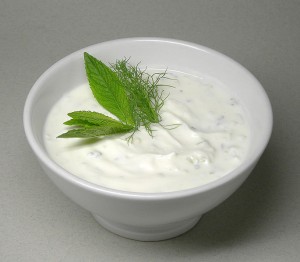I recently looked at the relationship between yoghurt consumption and cancer incidence over at the anticancer.org.uk website, a relationship that suggests that probiotic yoghurt consumption was protective against cancer both for those who eat a ‘fast food’ diet and those women with a genetic predisposition to breast cancer. My article was triggered by the publication of a new piece of research that looked at cancer development in mice, and if you haven’t read the piece I’d certainly suggest it’s worth a few minutes of your time. My interest piqued, I’ve dug a little deeper into the health benefits of probiotic yoghurt, and for those of you who love the stuff, it’s pretty much all good news.
First up is a paper by the same group who did the cancer study. In a paper entitled ‘Microbial reprogramming inhibits Western diet-associated obesity’, published in the open access journal PLOS One, the authors found that mice fed a ‘fast food’ diet tended to develop obesity as they aged. And, as part of that obesity, these mice displayed inflammatory changes to their immune systems, much as happens in people with obesity or metabolic syndrome. This is one of the drivers for people to try out various ‘anti-inflammatory and anti-oxidant’ diets after all. In contrast to all this, the same type of mouse fed the same ‘fast food’ diet but with added probiotic yoghurt avoided the age-related obesity and the inflammatory changes in the immune system. So, just in case you didn’t get that the first time, these researchers discovered that the addition of probiotics to an existing ‘bad’ diet seemed to stop the side-effects of that poor diet. The same researchers dug deeper and found that it was the effect of the probiotics on specific species of immune cells that made all the difference.
If that isn’t good news on it’s own, looking into the literature we can find more evidence that yoghurt is good for you. You might not be convinced that what’s good for a mouse is likely to be good for a person. In general it’s right to be sceptical about mouse models and human health. So what about some evidence in people?
Type II diabetes is a condition that is age-related and is also driven by inflammation and oxidative stress, so if what the mice results suggests is true then we should see something here, right? And in we look at a human trial published in 2012, we do indeed see something interesting. In this trial they compared the effect of probiotic versus conventional yoghurt in patients with type II diabetes. Two groups of patients were compared, each consuming the same amount of yoghurt every day (300 g per day, if you’re asking) over a 6 week period. And at the end of that time the probiotic group showed significantly decreased blood glucose and HbA1c levels, and significantly increased anti-oxidant status. And just to show that even conventional yoghurt is good for you, both groups showed significantly reduced serum malondialdehyde concentration (a marker for oxidative stress) compared to the base-line before they started the trial.
This isn’t the only such result, there are plenty more. My personal favourite is a paper entitled: Probiotic bacteria induce a ‘glow of health’. In this one the authors find that feeding mice probiotics produces radiant skin and fur, even in elderly mice, and that it made them look younger and fitter. Yep – if you’re an elderly mice and you want to look young and attractive again then tuck into some of that probiotic yoghurt. Unfortunately there’s no news on whether this one is going to be followed up with a human trial.


